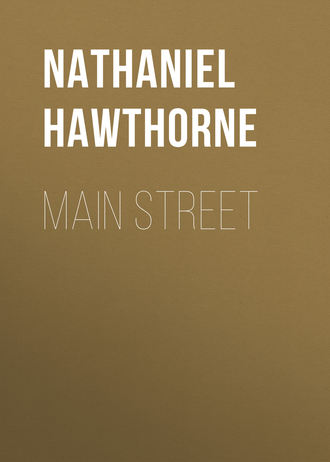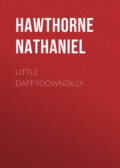
Натаниель Готорн
Main Street
Behind these two,—who help another along, and seem to be comforting and encouraging each other, in a manner truly pitiful, if it were not a sin to pity the old witch and wizard,—behind them comes a woman, with a dark proud face that has been beautiful, and a figure that is still majestic. Do you know her? It is Martha Carrier, whom the Devil found in a humble cottage, and looked into her discontented heart, and saw pride there, and tempted her with his promise that she should be Queen of Hell. And now, with that lofty demeanor, she is passing to her kingdom, and, by her unquenchable pride, transforms this escort of shame into a triumphal procession, that shall attend her to the gates of her infernal palace, and seat her upon the fiery throne. Within this hour, she shall assume her royal dignity.
Last of the miserable train comes a man clad in black, of small stature and a dark complexion, with a clerical band about his neck. Many a time, in the years gone by, that face has been uplifted heavenward from the pulpit of the East Meeting-House, when the Rev. Mr. Burroughs seemed to worship God. What!—he? The holy man!—the learned!—the wise! How has the Devil tempted him? His fellow-criminals, for the most part, are obtuse, uncultivated creatures, some of them scarcely half-witted by nature, and others greatly decayed in their intellects through age. They were an easy prey for the destroyer. Not so with this George Burroughs, as we judge by the inward light which glows through his dark countenance, and, we might almost say, glorifies his figure, in spite of the soil and haggardness of long imprisonment,—in spite of the heavy shadow that must fall on him, while death is walking by his side. What bribe could Satan offer, rich enough to tempt and overcome this mail? Alas! it may have been in the very strength of his high and searching intellect, that the Tempter found the weakness which betrayed him. He yearned for knowledge he went groping onward into a world of mystery; at first, as the witnesses have sworn, he summoned up the ghosts of his two dead wives, and talked with them of matters beyond the grave; and, when their responses failed to satisfy the intense and sinful craving of his spirit, he called on Satan, and was heard. Yet—to look at him—who, that had not known the proof, could believe him guilty? Who would not say, while we see him offering comfort to the weak and aged partners of his horrible crime,—while we hear his ejaculations of prayer, that seem to bubble up out of the depths of his heart, and fly heavenward, unawares,—while we behold a radiance brightening on his features as from the other world, which is but a few steps off,—who would not say, that, over the dusty track of the Main Street, a Christian saint is now going to a martyr’s death? May not the Arch-Fiend have been too subtle for the court and jury, and betrayed them—laughing in his sleeve, the while—into the awful error of pouring out sanctified blood as an acceptable sacrifice upon God’s altar? Ah! no; for listen to wise Cotton Mather, who, as he sits there on his horse, speaks comfortably to the perplexed multitude, and tells them that all has been religiously and justly done, and that Satan’s power shall this day receive its death-blow in New England.
Heaven grant it be so!—the great scholar must be right; so lead the poor creatures to their death! Do you see that group of children and half-grown girls, and, among them, an old, hag-like Indian woman, Tituba by me? Those are the Afflicted Ones. Behold, at this very instant, a proof of Satan’s power and malice! Mercy Parris, the minister’s daughter, has been smitten by a flash of Martha Carrier’s eye, and falls down in the street, writhing with horrible spasms and foaming at the mouth, like the possessed one spoken of in Scripture. Hurry on the accursed witches to the gallows, ere they do more mischief!—ere they fling out their withered aims, and scatter pestilence by handfuls among the crowd!—ere, as their parting legacy, they cast a blight over the land, so that henceforth it may bear no fruit nor blade of grass, and be fit for nothing but a sepulchre for their unhallowed carcasses! So, on they go; and old George Jacobs has stumbled, by reason of his infirmity; but Goodman Proctor and his wife lean on one another, and walk at a reasonably steady pace, considering their age. Mr. Burroughs seems to administer counsel to Martha Carrier, whose face and mien, methinks, are milder and humbler than they were. Among the multitude, meanwhile, there is horror, fear, and distrust; and friend looks askance at friend, and the husband at his wife, and the wife at him, and even the mother at her little child; as if, in every creature that God has made, they suspected a witch, or dreaded an accuser. Never, never again, whether in this or any other shape, may Universal Madness riot in the Main Street!
I perceive in your eyes, my indulgent spectators, the criticism which you are too kind to utter. These scenes, you think, are all too sombre. So, indeed, they are; but the blame must rest on the sombre spirit of our forefathers, who wove their web of life with hardly a single thread of rose-color or gold, and not on me, who have a tropic-love of sunshine, and would gladly gild all the world with it, if I knew where to find so much. That you may believe me, I will exhibit one of the only class of scenes, so far as my investigation has taught me, in which our ancestors were wont to steep their tough old hearts in wine and strong drink, and indulge an outbreak of grisly jollity.
Here it comes, out of the same house whence we saw brave Captain Gardner go forth to the wars. What! A coffin, borne on men’s shoulders, and six aged gentlemen as pall-bearers, and a long train of mourners, with black gloves and black hat-bands, and everything black, save a white handkerchief in each mourner’s hand, to wipe away his tears withal. Now, my kind patrons, you are angry with me. You were bidden to a bridal-dance, and find yourselves walking in a funeral procession. Even so; but look back through all the social customs of New England, in the first century of her existence, and read all her traits of character; and if you find one occasion, other than a funeral feast, where jollity was sanctioned by universal practice, I will set fire to my puppet-show without another word. These are the obsequies of old Governor Bradstreet, the patriarch and survivor of the first settlers, who, having intermarried with the Widow Gardner, is now resting from his labors, at the great age of ninety-four. The white-bearded corpse, which was his spirit’s earthly garniture, now lies beneath yonder coffin-lid. Many a cask of ale and cider is on tap, and many a draught of spiced wine and aqua-vitae has been quaffed. Else why should the bearers stagger, as they tremulously uphold the coffin?—and the aged pall-bearers, too, as they strive to walk solemnly beside it?—and wherefore do the mourners tread on one another’s heels?—and why, if we may ask without offence, should the nose of the Rev. Mr. Noyes, through which he has just been delivering the funeral discourse, glow like a ruddy coal of fire? Well, well, old friends! Pass on, with your burden of mortality, And lay it in the tomb with jolly hearts. People should be permitted to enjoy themselves in their own fashion; every man to his taste; but New England must have been a dismal abode for the man of pleasure, when the only boon-companion was Death!
Under cover of a mist that has settled over the scene, a few years flit by, and escape our notice. As the atmosphere becomes transparent, we perceive a decrepit grandsire, hobbling along the street. Do you recognize him? We saw him, first, as the baby in Goodwife Massey’s arms, when the primeval trees were flinging their shadow over Roger Conant’s cabin; we have seen him, as the boy, the youth, the man, bearing his humble part in all the successive scenes, and forming the index-figure whereby to note the age of his coeval town. And here he is, old Goodman Massey, taking his last walk,—often pausing,—often leaning over his staff,—and calling to mind whose dwelling stood at such and such a spot, and whose field or garden occupied the site of those more recent houses. He can render a reason for all the bends and deviations of the thoroughfare, which, in its flexible and plastic infancy, was made to swerve aside from a straight line, in order to visit every settler’s door. The Main Street is still youthful; the coeval man is in his latest age. Soon he will be gone, a patriarch of fourscore, yet shall retain a sort of infantine life in our local history, as the first town-born child.
Behold here a change, wrought in the twinkling of an eye, like an incident in a tale of magic, even while your observation has been fixed upon the scene. The Main Street has vanished out of sight. In its stead appears a wintry waste of snow, with the sun just peeping over it, cold and bright, and tingeing the white expanse with the faintest and most ethereal rose-color. This is the Great Snow of 1717, famous for the mountain-drifts in which it buried the whole country. It would seem as if the street, the growth of which we have noted so attentively, following it from its first phase, as an Indian track, until it reached the dignity of sidewalks, were all at once obliterated, and resolved into a drearier pathlessness than when the forest covered it. The gigantic swells and billows of the snow have swept over each man’s metes and bounds, and annihilated all the visible distinctions of human property. So that now the traces of former times and hitherto accomplished deeds being done away, mankind should be at liberty to enter on new paths, and guide themselves by other laws than heretofore; if, indeed, the race be not extinct, and it be worth our while to go on with the march of life, over the cold and desolate expanse that lies before us. It may be, however, that matters are not so desperate as they appear. That vast icicle, glittering so cheerlessly in the sunshine, must be the spire of the meeting-house, incrusted with frozen sleet. Those great heaps, too, which we mistook for drifts, are houses, buried up to their eaves, and with their peaked roofs rounded by the depth of snow upon them. There, now, comes a gush of smoke from what I judge to be the chimney of the Ship Tavern;—and another—another—and another—from the chimneys of other dwellings, where fireside comfort, domestic peace, the sports of children, and the quietude of age are living yet, in spite of the frozen crust above them.
But it is time to change the scene. Its dreary monotony shall not test your fortitude like one of our actual New England winters, which leaves so large a blank—so melancholy a death-spot-in lives so brief that they ought to be all summer-time. Here, at least, I may claim to be ruler of the seasons. One turn of the crank shall melt away the snow from the Main Street, and show the trees in their full foliage, the rose-bushes in bloom, and a border of green grass along the sidewalk. There! But what! How! The scene will not move. A wire is broken. The street continues buried beneath the snow, and the fate of Herculaneum and Pompeii has its parallel in this catastrophe.
Alas! my kind and gentle audience, you know not the extent of your misfortune. The scenes to come were far better than the past. The street itself would have been more worthy of pictorial exhibition; the deeds of its inhabitants not less so. And how would your interest have deepened, as, passing out of the cold shadow of antiquity, in my long and weary course, I should arrive within the limits of man’s memory, and, leading you at last into the sunshine of the present, should give a reflex of the very life that is flitting past us! Your own beauty, my fair townswomen, would have beamed upon you, out of my scene. Not a gentleman that walks the street but should have beheld his own face and figure, his gait, the peculiar swing of his arm, and the coat that he put on yesterday. Then, too,—and it is what I chiefly regret,—I had expended a vast deal of light and brilliancy on a representation of the street in its whole length, from Buffum’s Corner downward, on the night of the grand illumination for General Taylor’s triumph. Lastly, I should have given the crank one other turn, and have brought out the future, showing you who shall walk the Main Street to-morrow, and, perchance, whose funeral shall pass through it!







